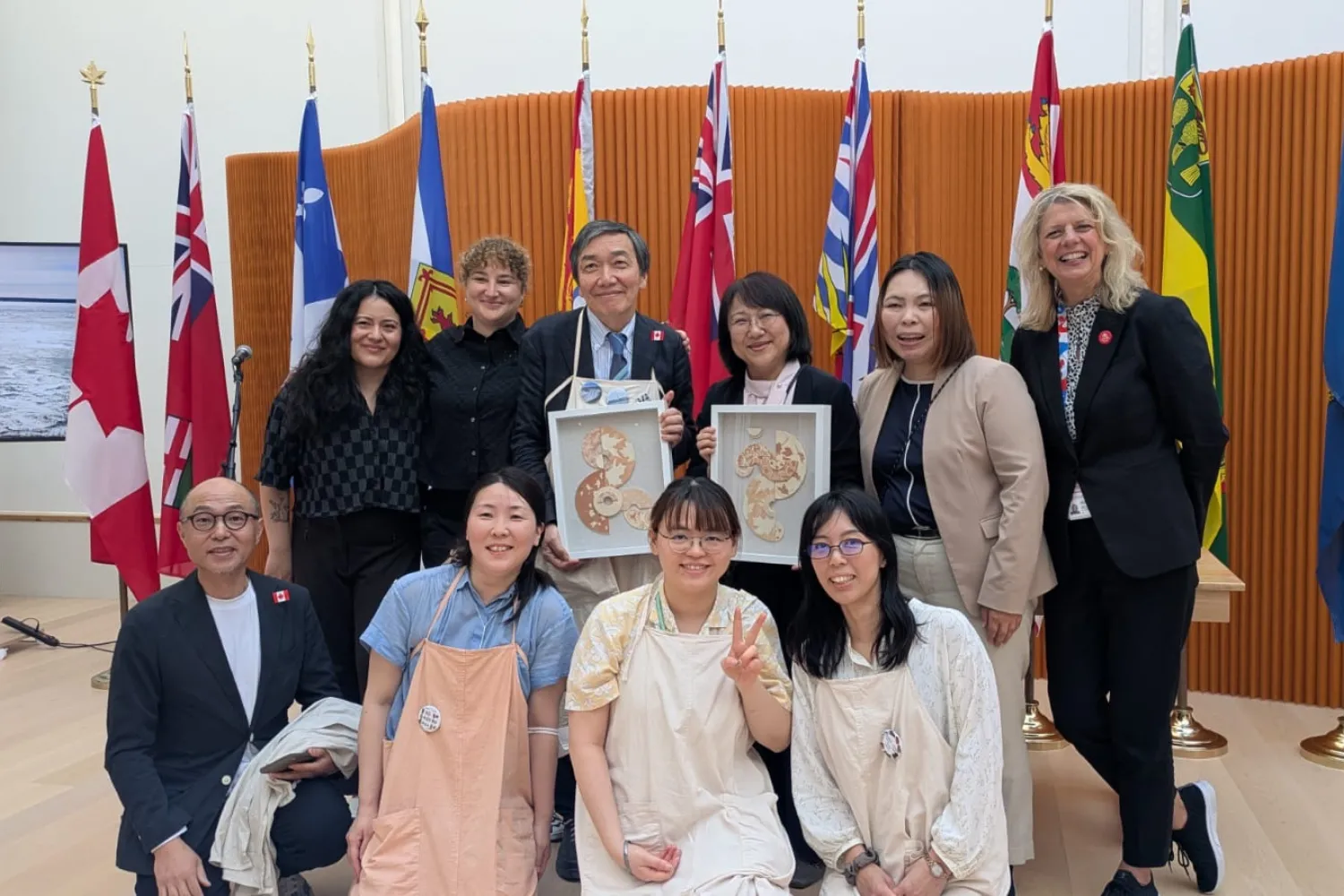From virtual beginnings to in-person connection, a mail-based pigment exchange between OCAD U students and Professor Emeritus Kouan Hashimoto of Joshibi University of Art and Design (Sagamihara, Japan) grew into a powerful global showcase of sustainable creativity. The project, Stones Across Cultures—a collaboration between Joshibi U and OCAD U, led by Jasmine Cardenas, International Networking Assistant, International Programs & Collaborations (IPCO)—invited students to explore the sustainable applications of stone-derived pigments through an innovative exchange and ceramics workshop. Participants were encouraged to reimagine materials from their local environments and experiment with natural pigments incorporated into clay. This cross-cultural initiative ultimately bridged continents, practices, and perspectives—culminating in a vibrant public activation.
The collaboration reached new heights in May 2025, when IPCO team members Jennie Suddick, and Jasmine Cardenas represented OCAD U at Expo 2025 Osaka. Through the support of Global Affairs Canada they joined Professor Hashimoto and colleagues from Joshibi University in delivering programming at the Jellyfish Pavilion, where they engaged hundreds of international visitors in hands-on activities using natural pigments, including fan painting and shoelace dyeing. Witnessing a virtual exchange that began in Fall 2024 evolve into large-scale public engagement was especially meaningful. Visitors were invited to interact with pigments made from Canadian stones and reflect on the role of sustainable alternatives in artistic practice.

Jennie Suddick, Manager, International Programs & Collaboration, reflects, “Having established this partnership after a very inspiring visit to Joshibi University in 2019, it has been truly inspiring to witness its remarkable evolution. Each year, more creatives (students, faculty, and staff) from both our institutions have contributed their unique perspectives, enriching our shared exploration of sustainable materials and artistic innovation. Presenting our collaborative work to the world at Expo 2025 Osaka has been a proud milestone—one that not only celebrates our achievements but also positions this partnership as a catalyst for future-thinking and creativity-driven innovation. I am deeply enthusiastic about what lies ahead as we continue to learn from one another and share our vision with the public.”
To commemorate the success of this partnership, a special ceremony was held at the Canada Pavilion at Expo 2025 Osaka, celebrating the Partnership Cities of Toronto and Sagamihara. The event, overseen by Laurie Peters, Commissioner General of the Canada Pavilion, honoured the ongoing collaboration between OCAD University and Joshibi University, which has grown since 2019 through joint research and initiatives grounded in eco-feminism, sustainability, and material exploration. During the celebration, artworks created using natural pigments were presented as gifts to the City of Sagamihara and Joshibi U—symbolizing our shared commitment to creative, sustainable exchange. This visit to Japan was an opportunity to be inspired by the country’s deep respect for tradition, environmental consciousness, and craft excellence. We are grateful to our partners at Joshibi U for their generous hospitality and collaboration.
Jennie and Jasmine were also invited to serve as panelists at the launch of RegenHERation, a global dialogue series on gender equality held at the Women’s Pavilion in partnership with Cartier and the Canada Pavilion. The event spotlighted OCAD U’s recent intercultural collaboration with Joshibi U, emphasizing how creative exchange can foster cross-cultural dialogue and promote sustainable art-making practices. The inaugural session celebrated Canadian women leading in art and design, setting the tone for a series focused on resilience and global equity. Panelists included Jennie Suddick and Jasmine Cardenas from OCAD U’s International Programs & Collaboration Office; Laurie Peters, Commissioner General for Canada at Expo 2025 Osaka Kansai; Melissa Weigel, Creative Director at Moment Factory (Tokyo); and Ms. Mihoko Iida, Cultural Affairs Officer at the Embassy of Canada to Japan, who also served as the panel’s emcee.
Following the Expo, they visited institutions in Osaka and Kyoto. A highlight was a visit to our partner institution Osaka Institute of Technology (OIT), where IPCO toured their state-of-the-art Umeda campus located in the heart of the city. They were warmly welcomed into classrooms, had the chance to observe student projects in progress, and engaged in meaningful conversations with faculty about current work in Robotics, System Design, and Design & Architecture. From artificial intelligence to sustainable technologies, OIT's commitment to integrating thoughtful design with innovation strongly resonated with our team.
This project would not have been possible without the vision, support, and dedication of many individuals. We extend our heartfelt thanks to Professor Emeritus Kouan Hashimoto and his colleagues Hiromichi Miyajima, Yuki Sakano, Mayura Fujino, Catherine Chee, and Akiko Hayashi for their invaluable collaboration and generosity. We are deeply grateful to the Canada Pavilion team for warmly hosting us at Expo 2025 Osaka—special thanks to Laurie Peters, Connie Lee, Cael Husband, Tonie St-Onge, and the entire pavilion team. A special thank you as well to Nicole Collins for paving the way and establishing the collaborative foundation with Joshibi University that made this partnership possible. We are excited about the continued growth of our international partnerships and remain committed to creating new opportunities for learning, exchange, and innovation.



